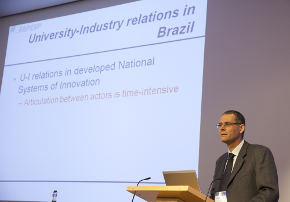

A panel at FAPESP Week London stresses the importance of this relationship in conducting research and explains the differences between the UK and Brazil (photo: Gustavo Camilo)
A panel at FAPESP Week London stresses the importance of this relationship in conducting research and explains the differences between the UK and Brazil.
A panel at FAPESP Week London stresses the importance of this relationship in conducting research and explains the differences between the UK and Brazil.

A panel at FAPESP Week London stresses the importance of this relationship in conducting research and explains the differences between the UK and Brazil (photo: Gustavo Camilo)
By Carlos Eduardo Lins da Silva, in London
Agência FAPESP – Research cooperation between universities and industry was the topic of the opening panel for the final day of FAPESP Week London, chaired by physicist Marcelo Knobel of the University of Campinas (Unicamp), scientific coordinator of the event in the British capital.
It was clear from the presentations that this relationship is established, deep rooted and productive in countries such as the UK but that it has only recently begun to reach a more mature stage in Brazil.
Simon Campbell, former president of the Royal Society of Chemistry, spoke about how the Royal Society, of which he is a member, “an essentially academic entity,” has viewed collaboration with industry as one of its strategic activities for centuries, since the time of James Watt, who patented the steam engine in 1769.
The Royal Society’s 2012-2017 strategic plan emphasizes the principle that a great deal of innovative scientific research occurs in industry, ensuring that both the business sector and the general public play an active role in the Royal Society. The plan also encourages translational science and prioritizes communicating science to society.
Among the Royal Society’s various activities to stimulate the relationship between academia and the private sector is the annual event known as “Labs to Riches,” which confers the Brian Mercer Award for Innovation to promote ideas in scientific research that may be commercially exploited through venture capital investments.
The Royal Society also offers programs that allow university scientists to work on research projects at companies, and vice versa, for periods of between six months and one year. It also offers financing to startups, short internships to scientists to work in civil service offices and at Parliament and short courses about innovation and business, all of which are designed, according to Campbell, to “build bridges” between science and society.
Tony Hey, vice-president of Microsoft Research Connections, was the session’s second speaker. He noted that his company has collaborated with FAPESP since 2006, a period in which 20 research projects have been approved, with emphasis on environmental topics since 2011.
Hey said that collaboration with FAPESP is one of the things that Microsoft deems most important, and it has served as an example of one of the five models of cooperation with academia that the company has adopted: namely, simple and direct funding (to help foment speculative research), consortia (such as those that the company maintains with MIT’s Media Lab and NYU’s Center for Urban Science), large projects (such as its sugarcane genome project with FAPESP), research centers (such as those at the universities of Berkeley and Illinois) and joint workshops (that function as precursors to larger projects).
Sérgio Queiroz, coordinator of the Research Innovation programs for FAPESP, described the foundation’s various Research Innovation programs, particularly the Innovative Research in Small Businesses Program (PIPE) and the Partnership for Technological Innovation (PITE).
Queiroz stressed that most Brazilian academic institutions are relatively young and stated that cooperation between universities and industry in Brazil as a whole has improved in recent years. “We’re beginning to establish a more mature relationship in Brazil.”
David Jones, technology director of the BG Group, concluded the panel. He said that among the main objectives of his company in Brazil is building an R&D infrastructure for his company in Brazil and helping to increase academic capacity in Brazil. He also mentioned that an agreement between the BG Group and FAPESP was signed during the opening ceremony of FAPESP Week London.
According to Jones, important factors for the success of cooperative efforts between universities and industry include the existence of a real connection between the research and the company’s business strategy, commitment to long-term projects and alignment and convergence of the institutional perspectives between the partners.
Republish
The Agency FAPESP licenses news via Creative Commons (CC-BY-NC-ND) so that they can be republished free of charge and in a simple way by other digital or printed vehicles. Agência FAPESP must be credited as the source of the content being republished and the name of the reporter (if any) must be attributed. Using the HMTL button below allows compliance with these rules, detailed in Digital Republishing Policy FAPESP.





